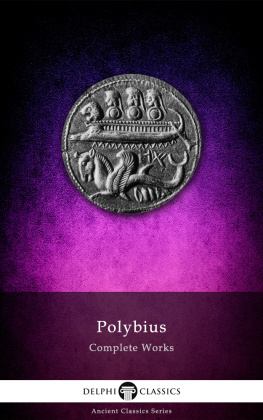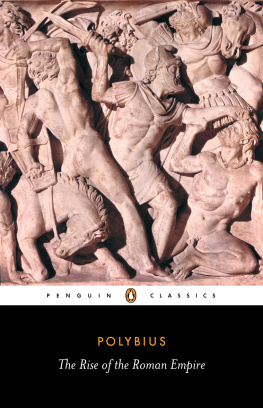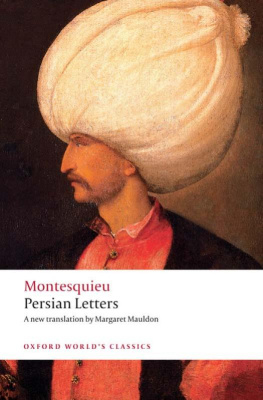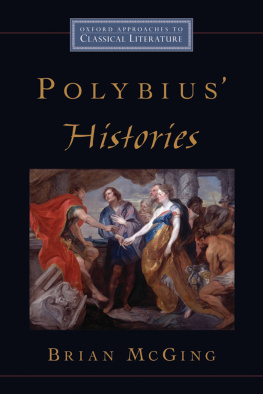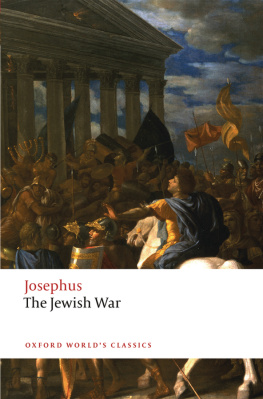Polybius - The Histories (Oxford World’s Classics)
Here you can read online Polybius - The Histories (Oxford World’s Classics) full text of the book (entire story) in english for free. Download pdf and epub, get meaning, cover and reviews about this ebook. year: 2010, publisher: Oxford University Press, genre: Art. Description of the work, (preface) as well as reviews are available. Best literature library LitArk.com created for fans of good reading and offers a wide selection of genres:
Romance novel
Science fiction
Adventure
Detective
Science
History
Home and family
Prose
Art
Politics
Computer
Non-fiction
Religion
Business
Children
Humor
Choose a favorite category and find really read worthwhile books. Enjoy immersion in the world of imagination, feel the emotions of the characters or learn something new for yourself, make an fascinating discovery.

- Book:The Histories (Oxford World’s Classics)
- Author:
- Publisher:Oxford University Press
- Genre:
- Year:2010
- Rating:5 / 5
- Favourites:Add to favourites
- Your mark:
- 100
- 1
- 2
- 3
- 4
- 5
The Histories (Oxford World’s Classics): summary, description and annotation
We offer to read an annotation, description, summary or preface (depends on what the author of the book "The Histories (Oxford World’s Classics)" wrote himself). If you haven't found the necessary information about the book — write in the comments, we will try to find it.
The Histories (Oxford World’s Classics) — read online for free the complete book (whole text) full work
Below is the text of the book, divided by pages. System saving the place of the last page read, allows you to conveniently read the book "The Histories (Oxford World’s Classics)" online for free, without having to search again every time where you left off. Put a bookmark, and you can go to the page where you finished reading at any time.
Font size:
Interval:
Bookmark:

Great Clarendon Street, Oxford OX2 6DP
Oxford University Press is a department of the University of Oxford.
It furthers the Universitys objective of excellence in research, scholarship,
and education by publishing worldwide in
Oxford New York
Auckland Cape Town Dar es Salaam Hong Kong Karachi
Kuala Lumpur Madrid Melbourne Mexico City Nairobi
New Delhi Shanghai Taipei Toronto
With offices in
Argentina Austria Brazil Chile Czech Republic France Greece
Guatemala Hungary Italy Japan Poland Portugal Singapore
South Korea Switzerland Thailand Turkey Ukraine Vietnam
Oxford is a registered trade mark of Oxford University Press
in the UK and in certain other countries
Published in the United States
by Oxford University Press Inc., New York
Translation Robin Waterfield 2010
Editorial material Brian McGing 2010
The moral rights of the author have been asserted
Database right Oxford University Press (maker)
First published as an Oxford Worlds Classics paperback 2010
All rights reserved. No part of this publication may be reproduced, stored in a retrieval system, or transmitted, in any form or by any means, without the prior permission in writing of Oxford University Press, or as expressly permitted by law, or under terms agreed with the appropriate reprographics rights organization. Enquiries concerning reproduction outside the scope of the above should be sent to the Rights Department, Oxford University Press, at the address above
You must not circulate this book in any other binding or cover
and you must impose this same condition on any acquirer
British Library Cataloguing in Publication Data
Data available
Library of Congress Cataloging in Publication Data
Data available
Typeset by Glyph International, Bangalore, India
Printed in Great Britain
on acid-free paper by
Clays Ltd., St lves plc
ISBN 978-0-19-953470-8
1 3 5 7 9 10 8 6 4 2
OXFORD WORLDS CLASSICS
For over 100 years Oxford Worlds Classics have brought readers closer to the worlds great literature. Now with over 700 titlesfrom the 4,000-year-old myths of Mesopotamia to the twentieth centurys greatest novelsthe series makes available lesser-known as well as celebrated writing.
The pocket-sized hardbacks of the early years contained introductions by Virginia Woolf, T. S. Eliot, Graham Greene, and other literary figures which enriched the experience of reading. Today the series is recognized for its fine scholarship and reliability in texts that span world literature, drama and poetry, religion, philosophy, and politics. Each edition includes perceptive commentary and essential background information to meet the changing needs of readers.
Refer to to navigate through the material in this Oxford Worlds Classics ebook. Use the asterisks (*) throughout the text to access the hyperlinked Explanatory Notes.
OXFORD WORLDS CLASSICS

POLYBIUS

Translated by
ROBIN WATERFIELD
With an Introduction and Notes by
BRIAN McGING

OXFORD WORLDS CLASSICS
THE HISTORIES
POLYBIUS, son of Lycortas, was a statesman, soldier, explorer, and historian from the Greek city of Megalopolis in the Peloponnese. He was born in about 200 BC and died probably around 118. His career as a leading politician in the confederation of Peloponnesian states known as the Achaean League was cut short when he found himself among 1,000 Achaean leaders deported to Italy after the Roman victory over Macedon in 168. He spent seventeen years in exile in Rome where he befriended the young Scipio Aemilianus. He was with Scipio at the destruction of Carthage in 146, a year in which the Achaean League also met with destruction at the hands of Rome. Polybius played a major role in the reconstruction of Greece after this disaster. At some stage he retraced Hannibals march from Spain to Italy, and also sailed into the Atlantic and down the coast of west Africa. He wrote works (no longer extant) on tactics, on Romes war against Numantia in Spain, on the equatorial region, and on the great Achaean statesman Philopoemen, but his main literary enterprise was the Histories, a study in forty books of Romes rise to world power and her method of rule in the years 220146 BC. Only the first five books survive in full, but there are extensive excerpts from many of the others, including Book 12, an analysis of how to write history (and how not to write it), and Book 6, a study of the Roman constitution.
ROBIN WATERFIELD is a writer, living in Greece. His previous translations for Oxford Worlds Classics include Platos Republic and five other editions of Platos dialogues, Aristotles Physics, Herodotus Histories, Plutarchs Greek Lives and Roman Lives, Euripides Orestes and Other Plays and Heracles and Other Plays, Xenophons The Expedition of Cyrus, and The First Philosophers: The Presocratics and the Sophists.
BRIAN MCGING is Regius Professor of Greek at Trinity College Dublin. Among many other publications on Hellenistic history he has recently completed a book on Polybius (2010).
As the third century BC moved into its last quarter, Rome was standing on the threshold of Mediterranean dominion. Both in the period when kings ruled Rome and after the foundation of the Republic (traditionally dated to 509 BC) she had enjoyed a steady, indeed, in spite of setbacks relentless growth in political power. She had gradually absorbed the surrounding towns and areas of central Italy, and in due course brought to heel all challengers on the Italian peninsula. From 280 to 275 she had even seen off the threat of the Greek adventurer, Pyrrhus, king of Epirus, who had answered the call for help from the people of the south Italian town of Tarentum, and brought an army to confront Rome. The astute observer will have found it militarily and politically significant that although Pyrrhus actually defeated the Romans in battle on three occasions, his victories were unsustainably expensive (Pyrrhic), and he could not match the Italian manpower at Romes disposal.
Romes resources were soon tested again, this time by a much mightier opponent, the great maritime and mercantile power of Carthage. It is difficult to say who was responsible for the First Punic War (264241)perhaps both sides equallybut Carthage had long controlled western Sicily, and Roman meddling in the east of the island brought them into conflict. What might initially have been a localized firefight in the north-eastern corner soon developed into a struggle for control of all Sicily, a struggle which Rome eventually won.
Immediately after the war, Carthage had to face a revolt of her extensive mercenary forces, and Rome took advantage of the situation to seize Sardinia, another Carthaginian possession. Even without the benefit of hindsight, many contemporaries must have thought that there was unfinished business between the two powers and that it would again lead them into conflict. The causes of the Second Punic War (218201) are also uncertain, but it was Mediterranean dominion that was at stake. The east coast of Spain was the flashpointthe capture of Romes ally, Saguntum (modern Sagunto), by the brilliant young commander of the Carthaginian forces in Spain, Hannibal, would probably have been enough to precipitate warbut Hannibals decision to launch an invasion of Italy made it clear that this war was not going to be about bragging rights in Spain: the Carthaginian objective was the conquest of Rome. A series of early victories, culminating in the destruction of the Roman army at the battle of Cannae (216), put Hannibal within touching distance of success. But that was as good as it got for him: with the city of Rome apparently at his mercy he failed to besiege it, and although the war dragged on for another fifteen years in different theatres of war (Italy, Spain, Sicily, and eventually north Africa), Hannibal never again got close to achieving overall victory. In 202, having been recalled to Africa to defend Carthage, he suffered the same sort of defeat at the battle of Zama as he had inflicted on Rome at Cannae. Carthage, unlike Rome, did not have the resources to soak up defeat, and had no option but to surrender.
Next pageFont size:
Interval:
Bookmark:
Similar books «The Histories (Oxford World’s Classics)»
Look at similar books to The Histories (Oxford World’s Classics). We have selected literature similar in name and meaning in the hope of providing readers with more options to find new, interesting, not yet read works.
Discussion, reviews of the book The Histories (Oxford World’s Classics) and just readers' own opinions. Leave your comments, write what you think about the work, its meaning or the main characters. Specify what exactly you liked and what you didn't like, and why you think so.

